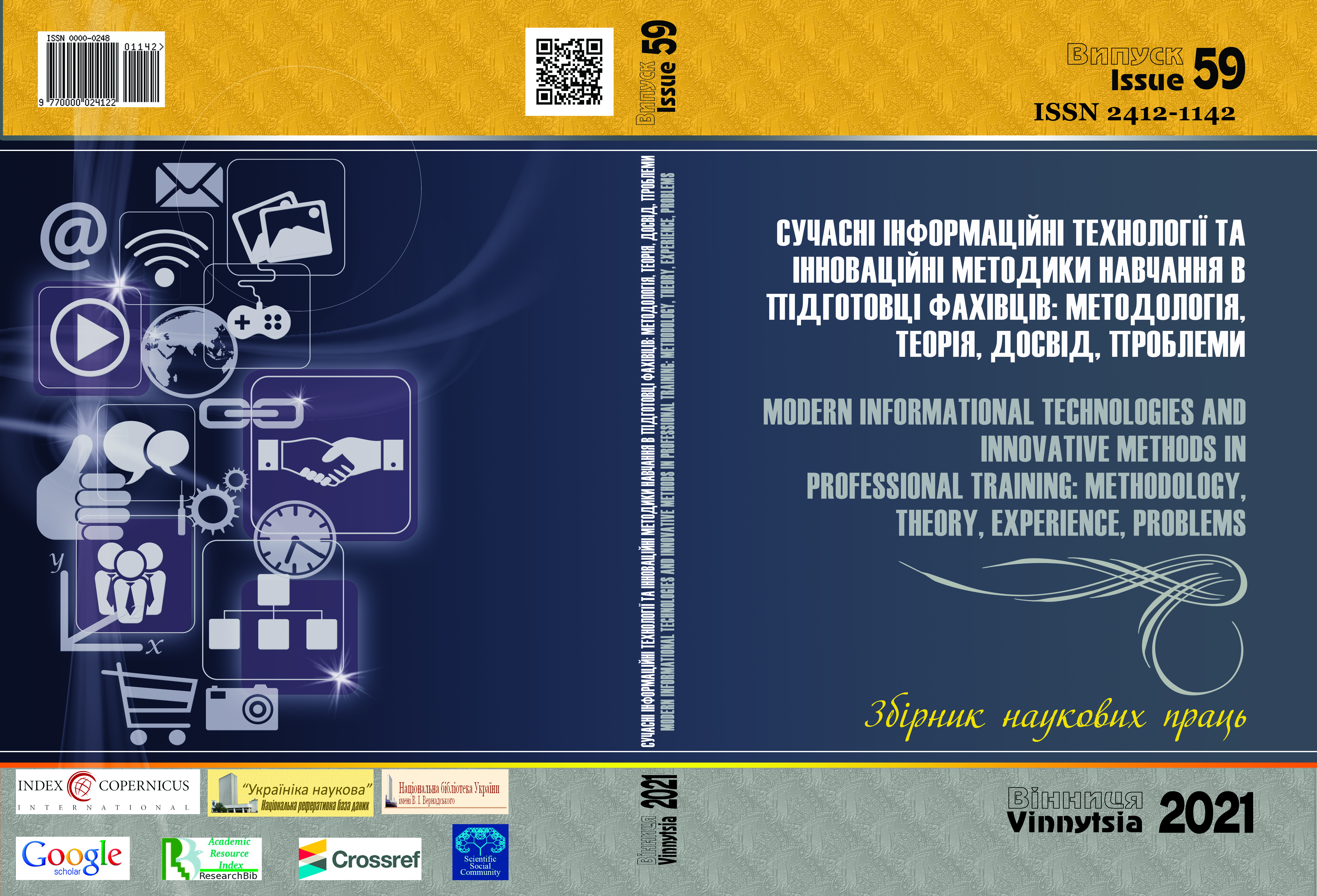DEVELOPMENT OF FUTURE TECHNOLOGY TEACHERS, TEACHERS OF PROFESSIONAL EDUCATION OF ARTISTIC AND CREATIVE ABILITIES DURING THE STUDY OF DECORATIVE AND APPLIED ARTS
DOI:
https://doi.org/10.31652/2412-1142-2021-59-54-64Keywords:
technology teacher, teacher of professional education, artistic and creative abilities, decorative and applied arts, methodical system, organizational and pedagogical conditionsAbstract
In the context of the revival of national culture, the problem of formation of future technology teachers, teachers of professional education of art and aesthetic culture becomes especially relevant, which causes radical changes in the development of their artistic and creative abilities. The basis for the development of artistic and creative abilities of students is created by the activity of decorative and applied arts. The main problem of our study is to develop a theoretical, methodological bases and methodological system of development of future teachers of technology, teachers of professional education of artistic and creative abilities during the teaching of decorative and applied arts. The purpose of the study provides a scientific and methodological justification for the development of future teachers of technology, teachers of vocational education, artistic and creative abilities in decorative and applied arts. To achieve it, theoretical methods were used: study, analysis and generalization of psychological and pedagogical, methodological, historical literature, monographs, systematization of theoretical provisions, comparative analysis of dissertations, study of curricula of disciplines of the cycle of professional training, study of reference books, manuals on decorative and applied arts and crafts; empirical: the study of pedagogical experience of students of general secondary education, vocational (technical) education and students of pedagogical institutions of higher education in the basics of decorative and applied arts, observation of classroom and independent educational and creative work, research and artistic activities students and pupils, conversations, questionnaires of teachers, students, pupils, study of products of artistic and creative activity of students and pupils in decorative and applied arts. The article theoretically substantiates the features and methods of development of artistic and creative abilities of students in decorative and applied arts. The main components of students' artistic and creative abilities are determined: mental (productive and reproductive), practical and personal qualities. The main groups of artistic and creative abilities of students in decorative and applied arts are defined: figurative-associative thinking, figurative-associative imagination, abilities in decorative and applied arts. A holistic methodological system and organizational and pedagogical conditions for the development of students' artistic and creative abilities in decorative and applied arts are proposed.
Downloads
References
Марущак О. В., Зузяк Т. П. Формування у майбутніх педагогів професійної компетенції з дизайн-
проектування засобами декоративно-ужиткового мистецтва. Вісник Національного університету
«Чернігівський колегіум» імені Т.Г. Шевченка. Серія: Педагогічні науки. Чернігів: НУЧК, 2020.
Вип. 8(164). С. 209-215.
Моісєєва Ф. А., Усачов В. А. Осмислення культури як процесу розвитку людського суспільства. Наука.
Релігія. Суспільство. 2013. No 4. С. 70-74.
Штефан А. Феномен творчої діяльності в авторському праві. Теорія і практика інтелектуальної
власності. 2018. No 4. С. 5-13.
Шинін О. С., Марущак О. В., Жижко Н. О., Ільченко О. М., Тарановська Н. В. Виховання у майбутніх
фахівців образотворчого та декоративного мистецтва художнього сприйняття: психолого-педагогічний
контекст. Fundamental and applied research in the modern world: abstracts of VI International Scientific and
Practical Conference (Boston, January 20-22, 2021). Boston: BoScience Publisher, 2021. Pp. 970-979.
Туриніна О. Л. Психологія творчості. К.: МАУП, 2007. 160 c.
Марущак О. В., Бойчук С. О. Методичні аспекти розвитку у майбутніх учителів трудового навчання та
технологій образно-асоціативного мислення у процесі художнього проектування костюма. Актуальні
проблеми підготовки вчителя трудового навчання та технологій: теорія, досвід, проблеми. Вінниця: ПП
Балюк І.Б., 2019. Вип. ІІ. C. 55-58.
Downloads
Published
Issue
Section
License
Copyright (c) 2021 Modern informational technologies and innovative methods in professional training: methodology, theory, experience, problems

This work is licensed under a Creative Commons Attribution 4.0 International License.

